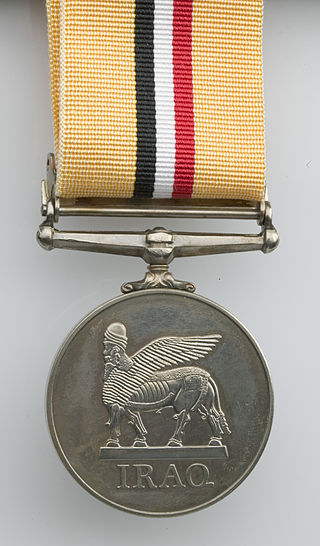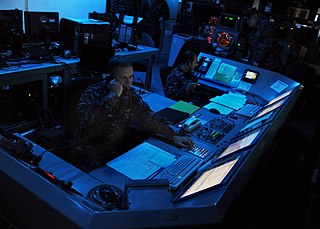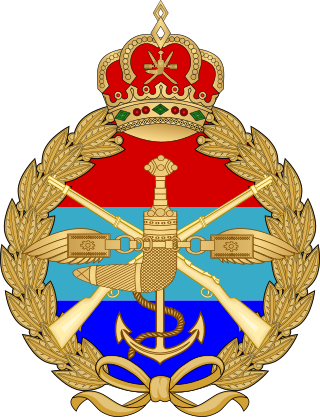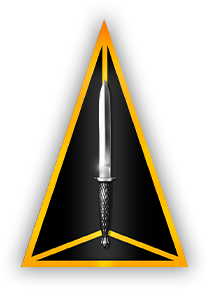Operation Nightingale was the codename of the Singapore Armed Forces' (SAF) humanitarian mission to the 1991 Gulf War.
Following the invasion of Kuwait by Iraq on 2 August 1990, a massive international coalition was formed to deter and repel Iraqi forces in Kuwait. A request was made by the British Government for medical assistance. In response, a 30-strong SAF medical team led by MAJ (Dr) Tan Chi Chiu of the 205th General Hospital was assembled and flown to Saudi Arabia in a mission codenamed Operation Nightingale on 20 January 1991.
The medical team was based in the British Army Rear Hospital at King Khalid International Airport in Riyadh and treated a total of 210 casualties. The mission ended on 13 March 1991 after a total of 54 days.

The Kuwait Military Forces are the military forces of the State of Kuwait. They consist of the Kuwait Air Force, the Kuwait Army, the Kuwait Navy & the Kuwait National Guard. The governing bodies are the Kuwait Ministry of Defense, the Kuwait Ministry of Interior, and the Kuwait Fire Service Directorate. The Emir of Kuwait is the commander-in-chief of all defense forces while the Crown Prince is the deputy commander.

The Gulf War was a 1990–1991 armed campaign waged by a 39-country military coalition in response to the Iraqi invasion of Kuwait. Spearheaded by the United States, the coalition's efforts against Iraq were carried out in two key phases: Operation Desert Shield, which marked the military buildup from August 1990 to January 1991; and Operation Desert Storm, which began with the aerial bombing campaign against Iraq on 17 January 1991 and came to a close with the American-led Liberation of Kuwait on 28 February 1991.

The 2003 invasion of Iraq was a United States-led invasion of the Republic of Iraq and the first stage of the Iraq War. The invasion phase began on 19 March 2003 (air) and 20 March 2003 (ground) and lasted just over one month, including 26 days of major combat operations, in which a combined force of troops from the United States, the United Kingdom, Australia and Poland invaded Iraq. Twenty-two days after the first day of the invasion, the capital city of Baghdad was captured by Coalition forces on 9 April 2003 after the six-day-long Battle of Baghdad. This early stage of the war formally ended on 1 May 2003 when U.S. President George W. Bush declared the "end of major combat operations" in his Mission Accomplished speech, after which the Coalition Provisional Authority (CPA) was established as the first of several successive transitional governments leading up to the first Iraqi parliamentary election in January 2005. U.S. military forces later remained in Iraq until the withdrawal in 2011.

Operation Telic was the codename under which all of the United Kingdom's military operations in Iraq were conducted between the start of the invasion of Iraq on 19 March 2003 and the withdrawal of the last remaining British forces on 22 May 2011. The bulk of the mission ended on 30 April 2009 but around 150 troops, mainly from the Royal Navy, remained in Iraq until 22 May 2011 as part of the Iraqi Training and Advisory Mission. 46,000 troops were deployed at the onset of the invasion and the total cost of war stood at £9.24 billion in 2010.
This is a list of aviation-related events from 1991.

The Singapore Armed Forces (SAF) are the military services of the Republic of Singapore, responsible for protecting and defending the security interests and the sovereignty of the country. A military component of the Ministry of Defence (MINDEF), the armed forces have four service branches: the Army, the Navy, the Air Force, and the Digital and Intelligence Service. An integrated force, it is one of the most capable, robust, technologically sophisticated and powerful militaries in Southeast Asia and the surrounding regions. The SAF is headed by the chief of defence force, who holds the rank of a Lieutenant-General or Vice-Admiral, and is appointed by the president of Singapore.

Military operations other than war (MOOTW) focus on deterring war, resolving conflict, promoting peace, and supporting civil authorities in response to domestic crises. The phrase and acronym were coined by the United States military during the 1990s, but it has since fallen out of use. The UK military has crafted an equivalent or alternate term, peace support operations (PSO). Both MOOTW and PSO encompass peacekeeping, peacemaking, peace enforcement and peace building. The People's Liberation Army developed a similar concept based on MOOTW, known as "Non-War Military Activities," which expanded on MOOTW and includes a range of activities characterized as "Confrontational," "Law Enforcement," "Aid & Rescue," or "Cooperative" in nature.

The Sultan of Oman's Armed Forces are the Royal Army of Oman, Royal Navy of Oman, Royal Air Force of Oman, Sultan's Special Force and other defense forces of the Sultanate of Oman. Since their formal establishment in the early 1950s, with British assistance SAF has twice overcome insurgencies which have threatened the integrity or social structure of the state, and more recently have contributed contingents or facilities to coalitions formed to protect Arab states of the Persian Gulf.
Orders and decorations conferred to military personnel of the Singapore Armed Forces in Singapore, listed by order of precedence:

The Iraqi invasion of Kuwait was an operation conducted by Iraq on 2 August 1990, whereby it invaded the neighboring State of Kuwait, consequently resulting in a seven-month-long Iraqi military occupation of the country. The invasion and Iraq's subsequent refusal to withdraw from Kuwait by a deadline mandated by the United Nations led to a direct military intervention by a United Nations-authorized coalition of forces led by the United States. These events came to be known as the first Gulf War, eventually resulting in the forced expulsion of Iraqi troops from Kuwait and the Iraqis setting 600 Kuwaiti oil wells on fire during their retreat, as a scorched earth strategy.

Ras al-Khafji or Khafji (الخفجي) is a town on the border between Saudi Arabia and Kuwait. It lies in what was before 1970 the Saudi Arabian–Kuwaiti neutral zone. The Japanese-owned Arabian Oil Company Ltd signed a concession agreement with the government of Saudi Arabia in December 1957 and with the government of Kuwait in July 1958 for exploration and development of hydrocarbon reserves in the offshore Neutral Zone. The Arabian Oil Company discovered the Khafji oil field in 1960 and the Hout oil field in 1963.

Australia was a member of the international coalition which contributed military forces to the 1991 Gulf War, also known as Operation Desert Storm. More than 1,800 Australian Defence Force (ADF) personnel were deployed to the Persian Gulf from August 1990 to September 1991, while contingents from the Royal Australian Navy circulated through the region in support of the sanctions against Iraq until November 2001. In August 1990, two frigates HMAS Adelaide and HMAS Darwin and the replenishment ship HMAS Success left for the Persian Gulf. HMAS Success had no air defences, so the Army 16th Air Defence Regiment was embarked. On 3 December 1990, HMAS Brisbane and HMAS Sydney (IV) relieved HMAS Adelaide and HMAS Darwin. On 26 January 1991, HMAS Westralia replaced HMAS Success. A Navy clearance diving team was also deployed for explosive ordnance disposal and demolition tasks. Australian ships were in danger of sea mines and possible air attacks. In a number of recorded incidents, HMAS Brisbane encountered free floating mines, on one occasion narrowly avoiding a collision. Both HMA Ships Brisbane and Sydney encountered significant air threat warnings from Iran and Iraq throughout the initial period of the commencement of the Desert Storm Campaign. The detection of land based Silkworm anti-ship missiles from Iran throughout the campaign also added to the challenges for both crews as well as the multi-national Naval Forces.

The Multi-National Force – Iraq (MNF–I), often referred to as the Coalition forces, was a military command during the 2003 invasion of Iraq and much of the ensuing Iraq War, led by the United States of America, United Kingdom, Australia, Italy, Spain and Poland, responsible for conducting and handling military operations.

Opération Daguet was the codename for French operations during the 1991 Gulf War. 18,000 members of the French Armed Forces were deployed during the conflict and they represented the second largest European contingent. Operating on the left flank of the US XVIII Airborne Corps, the ground component of the French force, named Division Daguet, was formed in September 1990 in Saudi Arabia as part of France's contribution to Operation Desert Shield. France also deployed several combat aircraft and naval units. Opération Daguet was commanded by Army general Michel Roquejeoffre.

The Gulf War Medal was a campaign medal approved in 1992, for issue to officers and men of British forces who served in Kuwait and Saudi Arabia during Operation Granby in 1990–91.

Operation Friction was a Canadian military operation that saw the contribution of 4,500 Canadian Forces personnel to the 1991 Gulf War. The larger US components were Operation Desert Shield and Operation Desert Storm.
Singapore has had an history of armed conflict and personnel dating to the colonial period.
No. 4626 Aeromedical Evacuation Squadron is a unit of the British Royal Auxiliary Air Force, which manages, maintains and trains its personnel for operational readiness in support of RAF requirements for Aeromedical Evacuation and Pre-Hospital Emergency Care, Primary Healthcare (PHC) and individual augmentees to other military healthcare capabilities, in times of conflict or crisis.

The Army Deployment Force (ADF) is a rapid deployment unit of the Singapore Army responsible for conducting counter-terrorism and expeditionary operations. It consists of only regular servicemen, primarily from the Guards formation. The ADF was established in 2016, in response to modernised terrorist attacks such as the November 2015 Paris attacks.